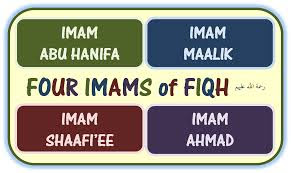Enjoy the best John Keats Quotes at BrainyQuote. Quotations by John Keats, English Poet
Monday, August 31, 2015
Thursday, August 13, 2015
Tuesday, August 4, 2015
The Four Imams - Biography of the Four Great Imams
Who is Imaam?
An imam is an Islamic leadership position. It is most commonly in the context of a worship leader of a mosque and Muslim community by Sunni Muslims. In this context, Imams may lead Islamic worship services, serve as community leaders, and provide religious guidance.
The Four Great Imams of Islamic Jurisprudence
Imam Shafi`i
Imaam Muhammad bin Idris Shafi`i was one of the greatest imams of fiqh. He was born in 150 A.H. in Palestine, the same year as Imam Abu Hanifa died. He shared the lineage with Prophet Muhammad (peace be upon him). With very humble beginnings, he came to Makkah at the age of 10 where he began his formal education. He studied fiqh from teachers like Imam Shaybaani who was one of the famous scholars of the Hanafi School of fiqh, Muslim bin Khalil al Zanji, Sufyaan bin Uyayana and Imam Maalik bin Anas. He had an amazing memory which enabled him to memorize Qur�an by the age of seven and by the time he turned 15, he had memorized Muwatta.
Imam Shafi`i is attributed with two madhahib; al-qad�m (the Old) from his stay in Iraq and al-jad�d (the New) from his stay in Egypt. Al-jadid forms most of the Shafi`i fiqh except in a limited number of cases where scholars have followed al-qad�m. The most famous works of the imam include Kitab al-Umm (the source of al-qad�m) and Kitab al-Hujja (the source of al-jad�d). A significant contribution of imam Shafi`i is the distinction between good bid`a and bad bid`a. In his words, �Therefore, whatever innovation conforms to the Sunnah is approved (mahm�d), and whatever opposes it is abominable (madhm�m).�
He is known for his mastery of the Arabic language, eloquence, humility, and knowledge of hadith. As acknowledged by Imaam Ahmed bin Hanbal, �Our napes were in the hands of the Companions of Abu Hanifah (RA) when it came to hadith (i.e. we were inclined to them more) until we saw Imaam Shafi`i, he was the most knowledgeable in the Book of Allah and the Sunnah of Rasulullah (Sallallahu Alaihi Wa Sallam) that he would even suffice one who was not well informed in Hadith.�
He met with his creator on the last day of Rajab in Egypt in the year 204 A.H.
Imam Ahmad ibn Hanbal
Imam Ahmad ibn Hanbal also referred as �Sheikh ul-Islam� , was born in Baghdad in 164 A.H. He started learning fiqh from the famous scholar Qadhi Abu Yusuf but later discontinued the study of fiqh in favor of hadith. He was an authority in many disciplines including Hadith, fiqh, tafsir, science of abrogation, theology, recitation of Qur�an, and Arabic language.
One of the most significant events of his life was the trial of �khalq-e-Qur�an� (creation of Qur�an) during the reign of Abbaside caliph Ma�mun. Mu`tazila had instigated the belief that Allah created His speech as a distinct entity and called it the Qur�an. This was against the orthodox Muslim belief. The caliph forced all of the scholars of the time to accept this belief and most of them did but Imam Ahmad completely disregarded the pressure and refused to accept this heresy. As a result, he was imprisoned and severely tortured for over two years.
He was highly regarded by the likes of Imam Shafi`i, who said, �I left Baghdad, and I did not leave behind me a man better, having more knowledge, or greater fiqh (understanding), nor having greater taqwa (piety) than Ahmad Ibn Hanbal.� According to Abu Dawood, �The lectures of Ahmad were sittings of the Hereafter. He would not mention in them anything of the worldly affairs; and I never saw him mention this world.� The famous scholar Yahya ibn Ma�in praised him in these words, �I have not seen the like of Ahmad, we have accompanied him for fifty years, and he never boasted about anything from the good which he was characterized with.�
After a brief illness he took his last breath on Friday, the 12 of Rabi� al-Awwal 241 A.H. His funeral procession was perhaps the largest in the history of Arabia; over one million people attended the funeral.
An imam is an Islamic leadership position. It is most commonly in the context of a worship leader of a mosque and Muslim community by Sunni Muslims. In this context, Imams may lead Islamic worship services, serve as community leaders, and provide religious guidance.
The Four Great Imams of Islamic Jurisprudence
Any mention of fiqh can�t be made without talking about the four great imams of fiqh and their schools of thought. Imam Abu Hanifa, Imam Malik ibn Anas,Imam Shafi`i, and Imam Ahmad ibn Hanbal are the luminous stars of the sky of Islamic jurisprudence.
Imam Abu Hanifa
First of the four great imams of fiqh, Nu`man ibn Thabit, Imam Abu Hanifa was born in 80 A.H. in Kufa. He is called �The Imam� by Abu Dawud. His school has the largest number of followers among the four imams. He was the only t�bi`i (who met with the companions of Prophet Muhammad peace be upon him) out of the four luminaries. He had the privilege of seeing Anas ibn Malik, Sahl ibn Sad as-Sa�idi, �Abdullah ibn Abi Awfa and Abu al-Fadl Amir ibn Wasila.
He was the pioneer in classification and compilation of fiqh. One of the biggest contributions of Imam Abu Hanifa is that he organized fiqh into functional sub categories starting with tahara (purification). All other imams and scholars followed his organization. He is known for his unparallel knowledge of fiqh and skill in qiyaas as well as taqwa and an amazing memory.
A quote attributed to Imam Shafi�i states that a person who wanted to specialize in fiqh should read Abu Hanifa�s books. Abdullah Ibn Mubarak said, �I have not seen another specialist as learned as Abu Hanifa in the knowledge of fiqh.� Sufyan al-Thawri encapsulated all of the qualities of im�m al-a`zam in this statement, �This man holds a high rank in knowledge, and if I did not stand up for his science I would stand up for his age, and if not for his age then for his God wariness (wara`), and if not for his God wariness then for his jurisprudence (fiqh).�
Qadi Abu Yusuf , while describing imam Abu Hanifa�s personality, said, �As far as I know, Abu Hanifah was extremely pious, avoided forbidden things, remained silent and absorbed in his thoughts most of the time, and answered a question only if he knew the answer. He was very generous and self-respecting, never asked a favor of anybody, shunned the company of the worldly-minded and held worldly power and position in contempt. He avoided slander and only talked well of people. He was a man of profound learning and was as generous with his knowledge as with his money.�
Despite being regarded as one of the greatest contributors to Islamic jurisprudence, Imam Shafi`i openly acknowledges the stature of Imam Abu Hanifa. �People are all the children of Abu Hanifa in fiqh.�
During the reign of Caliph Mansur of the Umayyad dynasty, Imam Abu Hanifa was offered the seat of Qaadi but he refused and was imprisoned thereafter. In 150 A.H. he was reportedly poisoned by the orders of the caliph and passed away.
Imam Malik Bin Anas
Imam Malik ibn Anas was the second of the four great imams of fiqh. He was born in 93 A.H. in Madinah. He had great reverence and respect for his birthplace and to show his respect, he never rode an animal inside Madinah. He studied under the finest teachers like Nafi�Abul-Zanaad, Hishaam bin Urwah bin Zubair, Abdullah bin Dinaar, Muhammad bin Muslim bin Shihaab al-Zhuhri and a number of other notables.
Muwatta (�the Approved�) is his seminal work that contains the most authentic and sound ahadith and sayings of the companions of Prophet Muhammad (pbuh). Imam Shafi`i considers it the most correct and the most beneficial book on earth after Qur�an. He was extremely careful in narrating hadith and said, �I do not accept knowledge from four types of people: a person well-known to be foolish, even though all the other people narrate from him, a person involved in committing heresy and calling others towards innovation in Deen, a person who lies in regular conversation with people, even though I do not accuse him as liar in regards to Hadith, a person who is pious worshipper or scholar, but does not properly and correctly memorize what he narrates.� His chain of narration (from Malik from Nafi� from Ibn Umar) was called �the golden chain of narrators� by Imam Bukhari.
He was regarded in the highest esteem by other three of the great imams.
Imam Ahmed bin Hanbal praised him, �I compared Imam Malik to Awzaa�eey, Thawri, Laith, Hammaad, and al-Hakam in knowledge, and he is the leader in Hadith and Fiqh.�
Imam Abu Hanifah said while acknowledging his qualities, �I have never seen anyone more fast understanding, correct answering, and test-taking than Imam Malik.�
After a brief illness he passed away on the 11th of Rabi-ul-Awwal in the year 179 A.H. and was buried in Janatul Baqi in Madinah.
Imam Shafi`i
Imaam Muhammad bin Idris Shafi`i was one of the greatest imams of fiqh. He was born in 150 A.H. in Palestine, the same year as Imam Abu Hanifa died. He shared the lineage with Prophet Muhammad (peace be upon him). With very humble beginnings, he came to Makkah at the age of 10 where he began his formal education. He studied fiqh from teachers like Imam Shaybaani who was one of the famous scholars of the Hanafi School of fiqh, Muslim bin Khalil al Zanji, Sufyaan bin Uyayana and Imam Maalik bin Anas. He had an amazing memory which enabled him to memorize Qur�an by the age of seven and by the time he turned 15, he had memorized Muwatta.
Imam Shafi`i is attributed with two madhahib; al-qad�m (the Old) from his stay in Iraq and al-jad�d (the New) from his stay in Egypt. Al-jadid forms most of the Shafi`i fiqh except in a limited number of cases where scholars have followed al-qad�m. The most famous works of the imam include Kitab al-Umm (the source of al-qad�m) and Kitab al-Hujja (the source of al-jad�d). A significant contribution of imam Shafi`i is the distinction between good bid`a and bad bid`a. In his words, �Therefore, whatever innovation conforms to the Sunnah is approved (mahm�d), and whatever opposes it is abominable (madhm�m).�
He is known for his mastery of the Arabic language, eloquence, humility, and knowledge of hadith. As acknowledged by Imaam Ahmed bin Hanbal, �Our napes were in the hands of the Companions of Abu Hanifah (RA) when it came to hadith (i.e. we were inclined to them more) until we saw Imaam Shafi`i, he was the most knowledgeable in the Book of Allah and the Sunnah of Rasulullah (Sallallahu Alaihi Wa Sallam) that he would even suffice one who was not well informed in Hadith.�
He met with his creator on the last day of Rajab in Egypt in the year 204 A.H.
Imam Ahmad ibn Hanbal
Imam Ahmad ibn Hanbal also referred as �Sheikh ul-Islam� , was born in Baghdad in 164 A.H. He started learning fiqh from the famous scholar Qadhi Abu Yusuf but later discontinued the study of fiqh in favor of hadith. He was an authority in many disciplines including Hadith, fiqh, tafsir, science of abrogation, theology, recitation of Qur�an, and Arabic language.
One of the most significant events of his life was the trial of �khalq-e-Qur�an� (creation of Qur�an) during the reign of Abbaside caliph Ma�mun. Mu`tazila had instigated the belief that Allah created His speech as a distinct entity and called it the Qur�an. This was against the orthodox Muslim belief. The caliph forced all of the scholars of the time to accept this belief and most of them did but Imam Ahmad completely disregarded the pressure and refused to accept this heresy. As a result, he was imprisoned and severely tortured for over two years.
He was highly regarded by the likes of Imam Shafi`i, who said, �I left Baghdad, and I did not leave behind me a man better, having more knowledge, or greater fiqh (understanding), nor having greater taqwa (piety) than Ahmad Ibn Hanbal.� According to Abu Dawood, �The lectures of Ahmad were sittings of the Hereafter. He would not mention in them anything of the worldly affairs; and I never saw him mention this world.� The famous scholar Yahya ibn Ma�in praised him in these words, �I have not seen the like of Ahmad, we have accompanied him for fifty years, and he never boasted about anything from the good which he was characterized with.�
After a brief illness he took his last breath on Friday, the 12 of Rabi� al-Awwal 241 A.H. His funeral procession was perhaps the largest in the history of Arabia; over one million people attended the funeral.
Monday, August 3, 2015
The Importance of Islamic Studies for Muslims - Muslim's Responsibilities
Importance of Studies in Islam:
Islam is the religion of peace, and it is one of the most sacred and trustworthy religions, which has given us guidance in every aspect of life. Islam has given us education with knowledge which has no limits. The Holy Quran is the most sacred book of Allah revealed on Prophet Muhammad (SAW), for the upliftment guidance and enriched messages to the humanity.
Islam attaches such great importance to knowledge and education. When the Quran began to be revealed, the first word of its first verse was 'Iqra' that is, read.
Islamic Studies is one of the best systems of education, which makes an ethical groomed person with all the qualities, which he/she should have as a human being.
Importance of Holy Qur'an in our Life:
Quran is the Holy book that has been granted to Muslims from ALLAH. It contains the words of ALLAH, which are the teachings of Islam. For this purpose Quran and Islam are highly related to each other. Quran reading and Quran learning is very necessary for the Muslims in order to follow the right path. Holy Quran was revealed to Prophet (PBUH) by ALLAH. The teachings of Quran are the guidelines for the Muslims to lead a blessed life.
Quran reading and Quran learning guides the Muslims to live in peace, respect each other and follow the righteous path. For every Muslim, the importance of Quran cannot be denied. Teachings of Quran guide the Muslims that how to pray and please ALLAH. Islam is based on certain rules and laws and Quran learning can only demonstrate these laws to the Muslims. Quran and Islam are essential for each other. None of the Muslims can lead his life without the Holy book. As stated by ALLAH �We have revealed to you the book which clarifies every matter.�
Being a Muslim, Quran reading and Quran learning is our foremost duty. The teachings of Quran do let us know the way of living adapted by our Prophet and His companions. The teachings of Quran allow Muslims to understand the goal of their life. For Muslims, the Holy Quran is the book of advice and wisdom. They should perform Quran reading regularly and keep the guidelines in their heart. The guidance should be taken for improving their lives so that they can be called true Muslims.
Allah says in Quran:
Surah Al-Zumr, ayah 9 reveals: "Are those equal, those who know and those who do not know?" Surah Al-Baqarah, ayah 269 reveals: "Allah grants wisdom to whom He pleases and to whom wisdom is granted indeed he receives an overflowing benefit."
According to Tirmidhi and Ibn Majah, Ibn Abbas (Allah be pleased with him) narrated that the Messenger of Allah (S) said: A single scholar of religion is more formidable against shaytaan than a thousand devout persons.
May Allah increase our Knowledge. Ameen..
Islam is the religion of peace, and it is one of the most sacred and trustworthy religions, which has given us guidance in every aspect of life. Islam has given us education with knowledge which has no limits. The Holy Quran is the most sacred book of Allah revealed on Prophet Muhammad (SAW), for the upliftment guidance and enriched messages to the humanity.
Islam attaches such great importance to knowledge and education. When the Quran began to be revealed, the first word of its first verse was 'Iqra' that is, read.
Islamic Studies is one of the best systems of education, which makes an ethical groomed person with all the qualities, which he/she should have as a human being.
Importance of Holy Qur'an in our Life:
Quran is the Holy book that has been granted to Muslims from ALLAH. It contains the words of ALLAH, which are the teachings of Islam. For this purpose Quran and Islam are highly related to each other. Quran reading and Quran learning is very necessary for the Muslims in order to follow the right path. Holy Quran was revealed to Prophet (PBUH) by ALLAH. The teachings of Quran are the guidelines for the Muslims to lead a blessed life.
Quran reading and Quran learning guides the Muslims to live in peace, respect each other and follow the righteous path. For every Muslim, the importance of Quran cannot be denied. Teachings of Quran guide the Muslims that how to pray and please ALLAH. Islam is based on certain rules and laws and Quran learning can only demonstrate these laws to the Muslims. Quran and Islam are essential for each other. None of the Muslims can lead his life without the Holy book. As stated by ALLAH �We have revealed to you the book which clarifies every matter.�
Being a Muslim, Quran reading and Quran learning is our foremost duty. The teachings of Quran do let us know the way of living adapted by our Prophet and His companions. The teachings of Quran allow Muslims to understand the goal of their life. For Muslims, the Holy Quran is the book of advice and wisdom. They should perform Quran reading regularly and keep the guidelines in their heart. The guidance should be taken for improving their lives so that they can be called true Muslims.
Allah says in Quran:
Surah Al-Zumr, ayah 9 reveals: "Are those equal, those who know and those who do not know?" Surah Al-Baqarah, ayah 269 reveals: "Allah grants wisdom to whom He pleases and to whom wisdom is granted indeed he receives an overflowing benefit."
According to Tirmidhi and Ibn Majah, Ibn Abbas (Allah be pleased with him) narrated that the Messenger of Allah (S) said: A single scholar of religion is more formidable against shaytaan than a thousand devout persons.
May Allah increase our Knowledge. Ameen..
Subscribe to:
Posts (Atom)

















